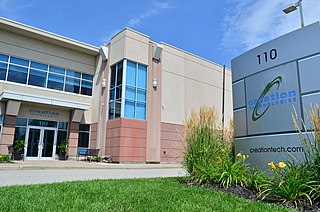
The United States Food and Drug Administration is a federal agency of the Department of Health and Human Services. The FDA is responsible for protecting and promoting public health through the control and supervision of food safety, tobacco products, caffeine products, dietary supplements, prescription and over-the-counter pharmaceutical drugs (medications), vaccines, biopharmaceuticals, blood transfusions, medical devices, electromagnetic radiation emitting devices (ERED), cosmetics, animal foods & feed and veterinary products.

The national drug code (NDC) is a unique product identifier used in the United States for drugs intended for human use. The Drug Listing Act of 1972 requires registered drug establishments to provide the Food and Drug Administration (FDA) with a current list of all drugs manufactured, prepared, propagated, compounded, or processed by it for commercial distribution. Drug products are identified and reported using the NDC.
An epinephrine autoinjector is a medical device for injecting a measured dose or doses of epinephrine (adrenaline) by means of autoinjector technology. It is most often used for the treatment of anaphylaxis. The first epinephrine autoinjector was brought to market in 1983.
Abbott Laboratories is an American multinational medical devices and health care company with headquarters in Green Oaks, Illinois, United States. The company was founded by Chicago physician Wallace Calvin Abbott in 1888 to formulate known drugs; today, it sells medical devices, diagnostics, branded generic medicines and nutritional products. It split off its research-based pharmaceuticals business into AbbVie in 2013.
A medical classification is used to transform descriptions of medical diagnoses or procedures into standardized statistical code in a process known as clinical coding. Diagnosis classifications list diagnosis codes, which are used to track diseases and other health conditions, inclusive of chronic diseases such as diabetes mellitus and heart disease, and infectious diseases such as norovirus, the flu, and athlete's foot. Procedure classifications list procedure code, which are used to capture interventional data. These diagnosis and procedure codes are used by health care providers, government health programs, private health insurance companies, workers' compensation carriers, software developers, and others for a variety of applications in medicine, public health and medical informatics, including:
An approved drug is a medicinal preparation that has been validated for a therapeutic use by a ruling authority of a government. This process is usually specific by country, unless specified otherwise.
The pharmaceutical industry in India was valued at an estimated US$42 billion in 2021 and is estimated to reach $130 billion by 2030. India is the world's largest provider of generic medicines by volume, with a 20% share of total global pharmaceutical exports. It is also the largest vaccine supplier in the world by volume, accounting for more than 60% of all vaccines manufactured in the world. Indian pharmaceutical products are exported to various regulated markets including the US, UK, European Union and Canada.
Structured Product Labeling (SPL) is a Health Level Seven International (HL7) standard which defines the content of human prescription drug labeling in an XML format. The "drug labeling" includes all published material accompanying a drug, such as the Prescribing Information which contains a great deal of detailed information about the drug. As of Release 4 of the SPL standard, 22,000 FDA informational product inserts have been encoded according to the standard.

DailyMed is a website operated by the U.S. National Library of Medicine (NLM) to publish up-to-date and accurate drug labels to health care providers and the general public. The contents of DailyMed is provided and updated daily by the U.S. Food and Drug Administration (FDA). The FDA in turn collects this information from the pharmaceutical industry.

An epedigree is an electronic document which provides data on the history of a particular batch of a drug. It satisfies the requirement for a drug pedigree while using a convenient electronic form.
Biscom, Inc. is a privately held software company founded in 1986. Headquartered in Westford, MA, its main focus is providing secure document delivery solutions to regulated industries.

President of the United States George W. Bush signed the Food and Drug Administration Amendments Act of 2007 (FDAAA) on September 27, 2007. This law reviewed, expanded, and reaffirmed several existing pieces of legislation regulating the FDA. These changes allow the FDA to perform more comprehensive reviews of potential new drugs and devices. It was sponsored by Reps. Joe Barton and Frank Pallone and passed unanimously by the Senate.
Documentum is an enterprise content management platform currently developed by OpenText. EMC acquired Documentum for US$1.7 billion in December 2003. The Documentum platform was part of EMC's Enterprise Content Division (ECD) business unit, one of EMC's four operating divisions.
The following outline is provided as an overview of and topical guide to clinical research:
The Unique Device Identification (UDI) System is intended to assign a unique identifier to medical devices within the United States, Europe, China, South Korea, Saudi Arabia and Taiwan. It was signed into law in the US on September 27, 2007, as part of the Food and Drug Administration Amendments Act of 2007.
Regulated Product Submission (RPS) is a Health Level Seven (HL7) standard designed to facilitate the processing and review of regulated product information. RPS is being developed in response to performance goals that the U.S. Food and Drug Administration (FDA) is to achieve by 2012, as outlined in the Prescription Drug User Fee Act (PDUFA). In addition to the U.S., regulatory agencies from Europe, Canada, and Japan are at varying levels of interest and participation. Currently, the second release of RPS is in development.

Creation Technologies is a global electronics manufacturing services (EMS) provider headquartered in Boston, Massachusetts, United States.
QIAGEN Silicon Valley is a company based in Redwood City, California, USA, that develops software to analyze complex biological systems. QIAGEN Silicon Valley's first product, IPA, was introduced in 2003, and is used to help researchers analyze omics data and model biological systems. The software has been cited in thousands of scientific molecular biology publications and is one of several tools for systems biology researchers and bioinformaticians in drug discovery and institutional research.

Sproxil is an American venture capital-backed for-profit company based in Cambridge, Massachusetts that provides a consumer product verification service to help consumers avoid purchasing counterfeit products. The service was the first Mobile Authentication Service (MAS) to launch in Nigeria.

Arven Pharmaceuticals is a Turkish pharmaceutical corporation headquartered in Istanbul established as a subsidiary of Toksöz Group in 2013. Arven's primary focus is development and production of high-technology inhaler and biotechnology products. The company is specialized on difficult to make products. Arven is the first Turkish company developing biosimilars for global markets, including the US and EU.







